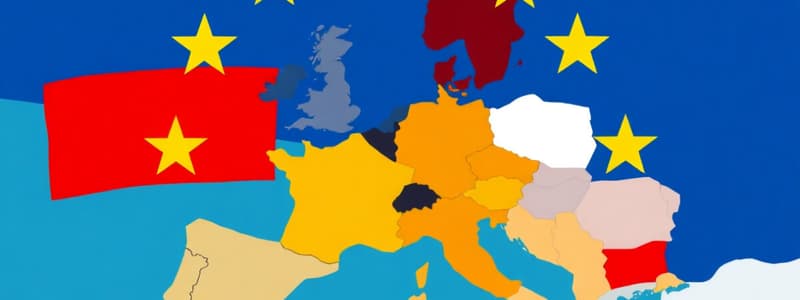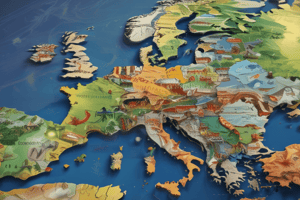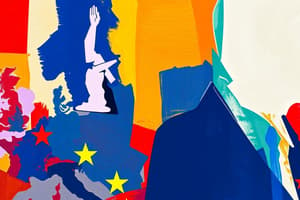Podcast
Questions and Answers
What is stated as a significant factor in the forging of Europe according to Jean Monnet?
What is stated as a significant factor in the forging of Europe according to Jean Monnet?
- Cultural exchanges between countries.
- Economic growth strategies.
- Agreements made in times of peace.
- Solutions adopted during crises. (correct)
Which recent crisis is mentioned as having influenced the development of EU security and defence policy?
Which recent crisis is mentioned as having influenced the development of EU security and defence policy?
- The global oil crisis.
- The COVID-19 pandemic. (correct)
- The rise of digital currencies.
- The financial crisis of 2008.
What role has the European Commission assumed in response to the war in Ukraine?
What role has the European Commission assumed in response to the war in Ukraine?
- A stronger actor in security policy. (correct)
- A controller of economic sanctions.
- A passive observer.
- An advocate for diplomatic negotiations only.
How has the EU responded to crises over the past decade according to the article?
How has the EU responded to crises over the past decade according to the article?
Which of the following crises is NOT specifically mentioned in the article?
Which of the following crises is NOT specifically mentioned in the article?
What role do earlier EU security and defense initiatives play in the context of the war in Ukraine?
What role do earlier EU security and defense initiatives play in the context of the war in Ukraine?
How has the perception of policy change in the context of crises evolved?
How has the perception of policy change in the context of crises evolved?
What significant event is noted as a watershed moment for European security and defense integration?
What significant event is noted as a watershed moment for European security and defense integration?
What impact did the war in Ukraine have on the European political scenario according to Coticchia?
What impact did the war in Ukraine have on the European political scenario according to Coticchia?
Which of the following factors contributed to the impetus for new integration in European defense post-2022?
Which of the following factors contributed to the impetus for new integration in European defense post-2022?
What do crisis situations have the potential to do within political organizations?
What do crisis situations have the potential to do within political organizations?
Which statement best describes the nature of crisis policymaking as suggested in the content?
Which statement best describes the nature of crisis policymaking as suggested in the content?
What characterizes the recent crisis policymaking in the EU compared to earlier crises?
What characterizes the recent crisis policymaking in the EU compared to earlier crises?
Which of the following best describes the nature of policymaking during crises in the EU?
Which of the following best describes the nature of policymaking during crises in the EU?
What effect do crises have on member states' requests to the EU?
What effect do crises have on member states' requests to the EU?
Which institution's role has been enhanced significantly during recent crises in the EU?
Which institution's role has been enhanced significantly during recent crises in the EU?
What does the term 'cultivated spill-over effects' refer to?
What does the term 'cultivated spill-over effects' refer to?
What is considered a significant result of the EU's crisis policymaking approach in recent years?
What is considered a significant result of the EU's crisis policymaking approach in recent years?
Which recent global event is identified as a pivotal moment in shifting European integration?
Which recent global event is identified as a pivotal moment in shifting European integration?
What has been a common response by EU institutions during crises like the COVID-19 pandemic and the Ukraine war?
What has been a common response by EU institutions during crises like the COVID-19 pandemic and the Ukraine war?
Which of the following best reflects the concept of 'political spill-over effects' during crises?
Which of the following best reflects the concept of 'political spill-over effects' during crises?
Who was primarily responsible for driving new actions regarding the sanctions process at the beginning?
Who was primarily responsible for driving new actions regarding the sanctions process at the beginning?
What did President von der Leyen instruct Commission officials to do before the Russian invasion of Ukraine?
What did President von der Leyen instruct Commission officials to do before the Russian invasion of Ukraine?
What was a significant component of the cooperation between the U.S. and EU leadership according to the EU ambassador?
What was a significant component of the cooperation between the U.S. and EU leadership according to the EU ambassador?
What did the Europeans emphasize regarding the effectiveness of the sanctions design?
What did the Europeans emphasize regarding the effectiveness of the sanctions design?
According to the content, who had a personal friendship that facilitated cooperation between the U.S. and the EU?
According to the content, who had a personal friendship that facilitated cooperation between the U.S. and the EU?
How did U.S. sanctions chief Daleep Singh perceive the Europeans' participation in the sanctions effort?
How did U.S. sanctions chief Daleep Singh perceive the Europeans' participation in the sanctions effort?
Which aspect of the EU effort was different from previous practices according to the Financial Times?
Which aspect of the EU effort was different from previous practices according to the Financial Times?
Why did U.S. leadership focus particularly on von der Leyen during the sanctions process?
Why did U.S. leadership focus particularly on von der Leyen during the sanctions process?
What role did U.S. intelligence warnings play in the EU's response prior to the Russian invasion?
What role did U.S. intelligence warnings play in the EU's response prior to the Russian invasion?
Flashcards
EU crises
EU crises
Significant events like the financial crisis, migration crisis, and war in Ukraine that have impacted the EU.
European Commission's Role
European Commission's Role
The European Commission plays a crucial part in developing EU security and defense policies.
EU Security and Defence Policy
EU Security and Defence Policy
The EU's strategies and actions regarding its collective safety and protection.
War in Ukraine
War in Ukraine
Signup and view all the flashcards
Commission's mandate expansion
Commission's mandate expansion
Signup and view all the flashcards
EU Crisis Policymaking
EU Crisis Policymaking
Signup and view all the flashcards
EU Security & Defence Initiatives
EU Security & Defence Initiatives
Signup and view all the flashcards
EU Global Strategy (EUGS)
EU Global Strategy (EUGS)
Signup and view all the flashcards
Crisis as Integration Catalyst
Crisis as Integration Catalyst
Signup and view all the flashcards
Supranational Theorizing
Supranational Theorizing
Signup and view all the flashcards
Precondition for New Initiatives
Precondition for New Initiatives
Signup and view all the flashcards
Policy Change in Crisis
Policy Change in Crisis
Signup and view all the flashcards
EU Integration Outcomes
EU Integration Outcomes
Signup and view all the flashcards
Policy Learning
Policy Learning
Signup and view all the flashcards
Facilitating Events
Facilitating Events
Signup and view all the flashcards
Cultivated Spill-Over Effects
Cultivated Spill-Over Effects
Signup and view all the flashcards
Policy Entrepreneurship
Policy Entrepreneurship
Signup and view all the flashcards
EU Institutional Constraints
EU Institutional Constraints
Signup and view all the flashcards
Pragmatic Turn
Pragmatic Turn
Signup and view all the flashcards
Member States’ Role in EU Integration
Member States’ Role in EU Integration
Signup and view all the flashcards
Who led the EU sanctions process?
Who led the EU sanctions process?
Signup and view all the flashcards
US involvement in EU sanctions
US involvement in EU sanctions
Signup and view all the flashcards
Why were visuals important?
Why were visuals important?
Signup and view all the flashcards
Von der Leyen's role
Von der Leyen's role
Signup and view all the flashcards
Who is Björn Seibert?
Who is Björn Seibert?
Signup and view all the flashcards
How did the EU and US coordinate?
How did the EU and US coordinate?
Signup and view all the flashcards
What was the departure from tradition?
What was the departure from tradition?
Signup and view all the flashcards
EU member state awareness
EU member state awareness
Signup and view all the flashcards
Importance of personal relationships
Importance of personal relationships
Signup and view all the flashcards
Study Notes
The Ukraine War and the Emergence of the European Commission as a Geopolitical Actor
- The Ukraine war significantly altered the European Commission's role in EU security and defense policy. This conflict highlighted vulnerabilities in European security frameworks and raised urgent questions regarding the EU's collective response mechanisms. As a result, the Commission began to take on a more pronounced leadership role in shaping policy directions related to security and defense.
- Historically, the Commission had a weak position in this policy domain. Traditionally, issues of defense and international security were primarily managed by member states and intergovernmental institutions such as the European Council and NATO. The Commission's limited influence stemmed from a focus on economic matters, with security concerns often viewed as secondary.
- The war accelerated the Commission's role and ambition in this area. The urgency of the situation prompted the Commission to engage more actively in areas previously dominated by national governments, advocating for cohesive EU-level responses and frameworks for action.
- The war served as an engine of integration, stimulating new security and defense initiatives. In response to the growing threat, the Commission successfully pushed for programs aimed at enhancing military capabilities, fostering cooperation among member states, and improving crisis response strategies that seek a more unified European defense posture.
- The Commission leverages crises to expand its mandate on security and defense policy, and sanctions. By addressing the challenges presented by the Ukraine conflict, the Commission has demonstrated its capacity to navigate complex geopolitical landscapes and promote EU solidarity, thereby enhancing its role as a pivotal actor in the design and implementation of sanctions and response mechanisms against aggression.
State of the Art: Commission and EU Security and Defense
- The European Commission plays a crucial role in shaping policy within the EU, often positioning itself as a proactive policy activist. It is uniquely situated to identify, frame, and address issues related to the competencies of the European Union, particularly in areas that necessitate a collective response from member states.
- Historically, the Commission exerted limited influence in areas of security and defense policy, which were primarily the domain of the individual member states, who retained sovereignty over these critical areas. However, recent global developments and evolving geopolitical landscapes have led to a notable shift, enhancing the Commission's capacity to contribute to defense and security dialogues within the EU framework.
- In order to understand the transformations occurring in the Commission's role regarding the EU's defense policy, scholars and analysts have developed a variety of theories. These theories range from institutionalist perspectives to constructivist insights, and they can be combined to offer a richer, multidimensional understanding of the complexities surrounding the Commission's growing involvement in defense policy formulation and implementation.
Sanctions Policy
- The Commission played a more active role in developing and launching sanctions packages against Russia.
- The Commission's influence over the sanctions process increased notably compared to previous instances. This was due to greater political focus and to avoid leaks.
- Cooperation with the US was crucial to the swift creation and implementation of the sanctions.
- Member states did, however, have a role in shaping the final sanctions packages.
Security and Defense Policy Development
- The EU's Strategic Compass in Security and Defence was being developed when the war started.
- The EU institutions and member states worked closely together during the development process.
- The Ukraine war has given a renewed focus and expedited action in the area of EU foreign, security and defense policy.
- The Commission and the EEAS used the Strategic Compass to launch new initiatives.
- There were discussions about a new short-term EU instrument to reinforce the defence industry.
Studying That Suits You
Use AI to generate personalized quizzes and flashcards to suit your learning preferences.




